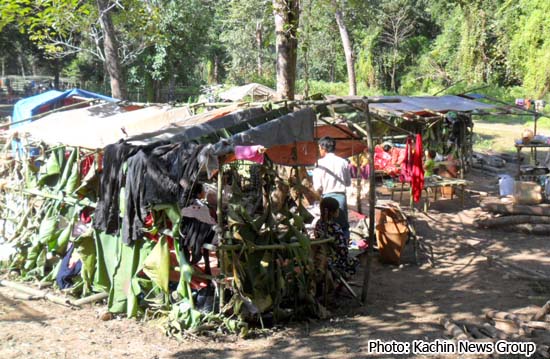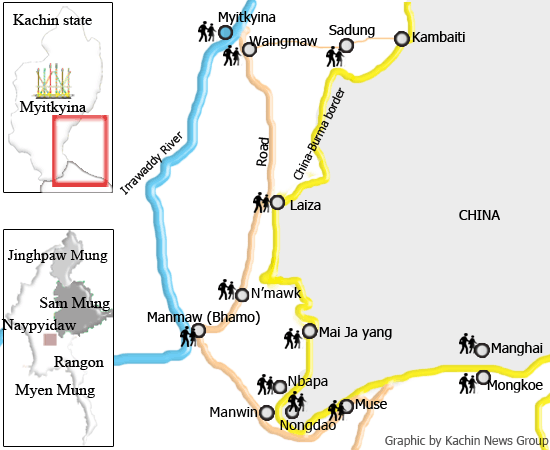Thousands of displaced Kachins, trapped on the China-Burma border, are facing increasingly dire conditions. However, relief groups working on the ground say those people have yet to receive any assistance from the United Nations and its affiliated agencies.

La Rip, Cordinator-2 of the Laiza-based Relief Action Network for Internally Displaced People and Refugees (RANIR) told the Kachin News Group today, “We have made a request to the Rangoon-based United Nations Office for the Coordination of Humanitarian Affairs (UNOCHA). However, we have been told only that they are still in discussions with the government about getting permission to help Kachin refugees.”
Doi Pyi Sa, chairman of the KIO’s IDP and Refugee Relief Committee (IRRC) estimates there are now more than 32,000 IDPs staying in camps located in territory controlled by the KIO.
The UN and UNOCHA were criticized in a report released this week by Physicians for Human Rights (PHR) over what the PHR perceives as inaction regarding the growing IDP and refugee crisis on the China border. The PHR report called on the UN to "…provide necessary aid to IDPs in Kachin State, and to those displaced along the Sino-Burmese border."
Tomas Ojea Quintana, UN Special Rapporteur on Human Rights for Burma, said in a report released in October that Burma’s government had refused a UN offer to provide assistance to displaced persons trapped on Burma-China the border.
Quintana wrote, “The United Nations approached the government [of Burma], offering assistance to all those in need. According to reliable sources, the government’s position is that assistance is currently provided at the local level and when needed they will seek further assistance from relevant partners.”
It remains unclear, however, whether UNOCHA will ever get access to the IDPs and refugees. At present, those trapped on the China-Burma border are getting by with basic food, clothing and medicine supplied by the KIO. Kachin church groups and other organizations inside Burma are also providing help, said Doi Pyi Sa. Nevertheless, supplies are running low as more people arrive on a daily basis.
Doi Pyi Sa said that while most IDPs in the KIO camps had received some assistance those refugees who crossed into China have received little or no support.
According to La Rip, at present there are 19 permanent IDP camps in KIO territory located along the China border in both Kachin and Northern Shan states, 12 are in Laiza, the KIO’s capital, and 7 are in Mai Ja Yang. In addition, there are least 10 or more temporary camps dangerously close to the front lines.

La Rip said the relief committee currently provides about $1.50 worth of food per person per day but that this couldn’t be sustained due to dwindling supplies.
The UN’s World Food Program, and other national and local NGO’s, are providing support for the estimated 10,000 internally displaced persons (IDPs) who are sheltering in Kachin churches in government-controlled Myitkyina, Waingmaw, Manmaw (Bhamo) and N’Mawk (Momauk).
Doi Pyi Sa also said that within the last two weeks 2,000 new refugees from the Manwin area in southeast Kachin State had crossed into China after the Burmese army launched a major offensive against the Kachin Independence Army’s Battalions 1 and 27.
Doi Pyi Sa added that, although the Chinese authorities allowed the refugees to cross the border, there were no proper shelters for them and they had received little or no aid.
It is also estimated that during the last two weeks more than 1,000 people hwere forced to flee their villages, located between Manwin and Kai Htik in Manmaw (Bhamo) District, and have made it to KIO-controlled Nbapa village.
This story was complied by our correspondent in Laiza.



